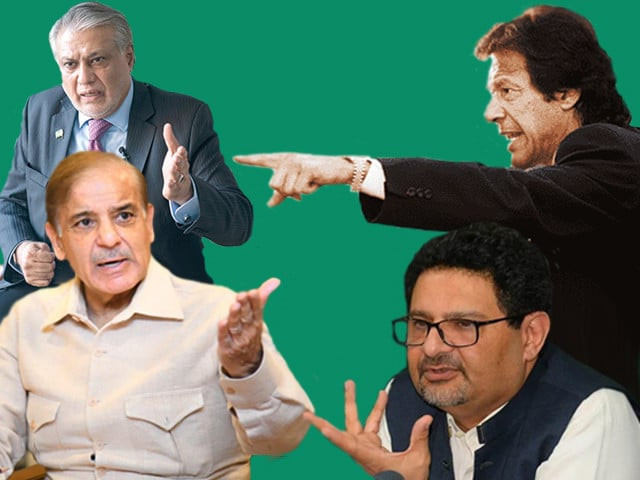It's quite a common practice for politicians to resign over a disastrous policy, complete failure, or incompetency. Whether you take the example of South Korea, where the Korean prime minister resigned over the ferry sinking, or New Zealand, where prime minister Jacinda Ardern resigned when she realised she was not a good fit, or our very dear Britain, where three prime ministers have resigned over the last four years.
In my country, however, the politicians are not that foolish. They quietly get away by simply blaming the disaster on the ‘previous government’, a ‘natural calamity’, or anything on Earth other than their ‘innocent, competent souls’.
When a train met an accident, someone asked the then minister of railway, Sheikh Rasheed, if he would accept the responsibility by resigning from his post, to which the honourable minister conveniently replied:
“Kyun, train main chala raha tha kiya?”
(Why, was I driving the train?)
Another 'visionary' leader and our former prime minister, Imran Khan, smartly blocked the door to any further reasoning by stating:
“U-turn a hallmark of great leadership.”
Doing a U-turn to reach one's objective is the hallmark of great leadership just as lying to save ill-gotten wealth is the hallmark of crooks.
— Imran Khan (@ImranKhanPTI) November 18, 2018
Although it didn't convince many, but who cares right?
There is no second opinion that the roots of the current economic crisis can still be traced to the previous ruling government of Pakistan Tehreek-e-Insaf (PTI). In a year when Pakistan's external debt payments were at a multi-year high, the PTI chairman's unprecedented and politically motivated move to slash fuel and electricity prices derailed the IMF program, which was no less than a disaster, especially considering the fragile phase of Pakistan's economy.
Although, even after the regime change and the succeeding government taking three long months to readjust the prices, yet thanks to the efforts of former finance minister, Miftah Ismail, we were finally able to get on board with IMF.
However, as soon as the country's economy showed signs of revival, Miftah was sacked, only to be replaced by his arch rival. And so, cruising through the air, Ishaq Dar was here to fix the economy with a ‘magic stick’ (or perhaps the Sharifs thought so). The statements Dar gave upon his arrival in Pakistan were so tempting that a layman like myself was left believing that the prodigal son of Pakistan's economy had finally arrived, and we were just days away from the land of milk and honey.
Yet the ‘bold’ decisions of the finance minister turned into a fiasco, and with ‘friendly countries’ not willing to come to the rescue, we are once again knocking on the door of the IMF, which will come at a cost. The inflation rate in Pakistan has already reached a 48-year high, which is expected to increase further.
As Dar's policy has apparently failed, it's the time for an evergreen all-time favourite political mantra. It doesn't matter which party comes to power, it's not important what year it is, the mantra stays the same: blame.
Every successive government blames the previous government. And by doing so, the new government not only acquits itself from criticism but also from any consequent responsibility. The respective party gets a face-saving slogan for the next five years, and once their tenure ends, a new party forms the government, leaving us with the same storyline but with new characters.
I have a dream that this culture of blame changes. I have a dream that Dar will take ownership of his failure with an open heart and set a precedent for his successors. And I have a dream for the start of a self-accountability culture in Pakistan, where public figures are open to accountability and no one hides behind the sham curtains of popularity.
With his conscience being the judge, I will leave Mr Dar with this quote from New Zealand’s recently resigned Ardern:
“I am leaving because with such a privileged role comes responsibility, the responsibility to know when you are the right person to lead and also when you are not.”
Unfortunately, this is not the first time that our economy has been put as a litmus test; in the early era of the PTI government, it also tried to experiment with the economy and delayed precious time before eventually securing a deal with the IMF. The question arises: can the condition of Pakistan's economy afford such experimentation? And can regulations be formulated to avoid such ventures in future?
We may have our political or personal differences, but something that unites us is much stronger than the differences. We all seek the betterment of Pakistan because this is where we all belong, and no matter in which part of the world we are, this land is where our strength originates.
It may seem a long shot, but I believe the Pakistani establishment and all political parties should join to form a unanimous long-term economic policy. An economic policy which is not affected by the change in governments. Where the passing government will not overspend in the year of the election, and the upcoming government has nothing to blame the previous one. If we can unite over a cricket match, we can certainly come together on this national issue, for the country is more important than our egos.
Let's unite and let it be the last economic disaster of Pakistan.
Let's hope for a better future, let's hope for a better Pakistan.
Pakistan Zindabad!



COMMENTS
Comments are moderated and generally will be posted if they are on-topic and not abusive.
For more information, please see our Comments FAQ